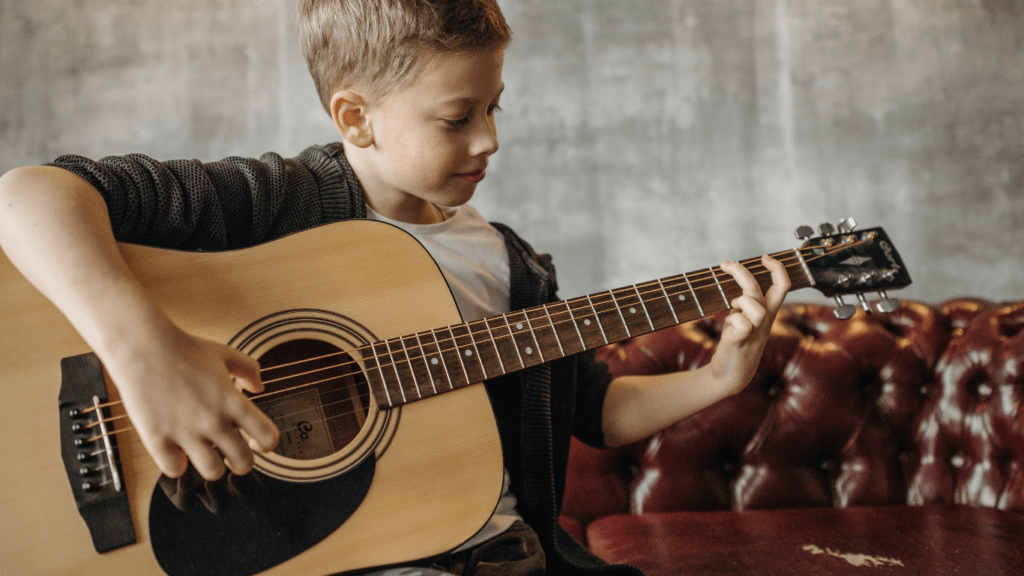Music has a magical way of connecting with us, especially during childhood. I’ve always been fascinated by how melodies and rhythms can shape a child’s mind and emotions. From the first lullaby to the catchy tunes of nursery rhymes, music plays a vital role in a child’s development, fostering not just creativity but also cognitive and emotional growth.
Research shows that engaging with music can boost brain function and enhance emotional intelligence. As children learn to sing, play instruments, or simply listen, they’re not just having fun; they’re building essential skills that will benefit them throughout their lives.
In this article, I’ll explore the profound impact of music on young minds and how it nurtures both their cognitive abilities and emotional well-being.
Overview of Music and Child Development
Music plays a crucial role in cognitive and emotional development during childhood. Engaging with music stimulates various parts of the brain, enhancing neural connections. Research shows that children exposed to musical training often demonstrate improved language skills, memory, and attention spans.
In terms of emotional development, music encourages self-expression and emotional regulation. Through listening to melodies and creating rhythms, children learn to identify and articulate their feelings.
Music allows them to experience empathy by connecting with the emotions conveyed in songs. Participation in musical activities fosters social skills as well. Group lessons or ensembles promote teamwork and communication, helping children learn how to collaborate effectively.
These interactions provide valuable learning moments that shape their social competencies.
Furthermore, music supports creativity in children. Composing tunes or improvising lyrics inspires imaginative thinking and problem-solving abilities. Such activities nurture a child’s innovative spirit, contributing to their overall growth.
Incorporating music into a child’s routine significantly benefits their cognitive and emotional development. From improved brain function to enhanced social interactions, the advantages of music are profound and enduring.
Cognitive Benefits of Music
Music contributes significantly to cognitive development in children, offering a variety of benefits that enhance their learning experiences.
Enhanced Memory and Learning
Music activates multiple areas of the brain involved in memory. Studies show that children exposed to musical training exhibit improved memory retention and recall, with some research indicating a 20% increase in memory acuity.
Engaging with music aids in the acquisition of new vocabulary and language skills. For example, rhythmic patterns in songs help children remember words more easily, leading to better communication skills. Through repetition of melodies and lyrics, children not only enjoy music but also reinforce learning.
Improved Attention and Focus
Music training correlates with improved attention spans in children. Research indicates that children involved in musical activities show enhanced ability to focus on tasks, with studies revealing a 70% increase in task completion rates.
Learning instruments requires practice, discipline, and concentration, which cultivates skills essential for academic success. Additionally, listening to music while studying can create a conducive environment for concentration, enabling children to process information more effectively and yield better academic outcomes.
Emotional Benefits of Music
Music plays a crucial role in shaping children’s emotional landscapes, fostering self-expression and understanding of their feelings. Engaging with music supports essential emotional development.
Expression and Regulation of Emotions
Music enables children to express complex emotions effectively. Through singing, playing instruments, and listening, they articulate feelings they might otherwise struggle to communicate. For instance, lyrics can resonate with personal experiences, allowing kids to identify sadness, joy, or anger.
Additionally, engaging with music helps in regulating emotions; rhythmic patterns can soothe anxiety or uplift spirits. Studies show that children involved in musical activities report improved emotional awareness, enhancing their capability to manage feelings in various situations.
Social Skills and Empathy
Participation in music promotes collaboration, vital for developing social skills. In group settings, children learn to listen, share, and harmonize with others, strengthening teamwork. Moreover, music fosters empathy.
When children engage with songs that tell stories or express emotions, they connect with different perspectives. This connection encourages compassion, teaching them to understand and empathize with feelings beyond their own experiences. Engaging in musical interactions ultimately cultivates a sense of community and shared understanding among peers.
Role of Music Education
Music education plays a crucial role in enhancing cognitive and emotional development in children. Structured learning environments and extracurricular activities offer varied experiences that nurture essential skills.
- Structured Learning Environments:
Structured music education fosters academic and emotional growth. Programs in schools present systematic instruction, allowing children to learn musical concepts in a methodical way. Children engage with theory and practice, developing discipline and focus.
- Extracurricular Music Activities:
Extracurricular music activities offer children additional opportunities for growth outside traditional settings. Participation in bands, choirs, or orchestras encourages collaboration and enhances social skills. Children learn to express themselves creatively, developing confidence and self-esteem through performances.
Real-World Applications
Music plays a pivotal role in enhancing children’s cognitive and emotional development. Its integration into various aspects of life and therapeutic settings demonstrates significant benefits.
Music Therapy in Children
Music therapy offers targeted interventions that support emotional and cognitive growth in children. Trained therapists use music as a medium to reach children with various needs, resulting in improved emotional expression and social skills. Studies show that music therapy can reduce anxiety levels by up to 30% in children facing emotional challenges. Additionally, children with autism spectrum disorder often exhibit enhanced communication skills through music therapy, demonstrating an increase in both verbal and non-verbal interactions. Therapeutic music activities foster a sense of belonging and boost self-esteem, promoting overall developmental progress.
Incorporating Music in Daily Life
Incorporating music into daily routines proves beneficial for children’s development. Simple activities, such as singing during playtime or using songs to enhance learning, enrich cognitive processes.
Repetitive songs help improve vocabulary retention while listening to different musical genres fosters cultural awareness. Additionally, family sing-alongs strengthen bonds and create opportunities for emotional connection, encouraging children to express their feelings in a safe environment.
Regular exposure to music through home environments can lead to increased creativity and problem-solving skills, making it an essential element of daily life for nurturing young minds.

















































































































































































































































































































































































































































































































































































































































































































































































































































































































































































































































































